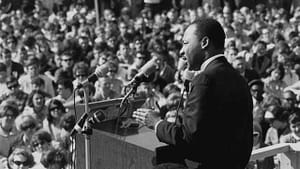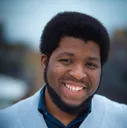Stay in the Loop
BSR publishes on a weekly schedule, with an email newsletter every Wednesday and Thursday morning. There’s no paywall, and subscribing is always free.
The truth about unity
For MLK Day 2021, can we fight our history of miseducation in America?

Miseducation impacts us in many ways, but one devastating consequence is how insignificant (call it “little”) we learn to feel. We get the idea that we’re too small to achieve anything on our own. Meanwhile (maybe consequently?), the narrative of “being united” has long felt like propaganda, a marketing scheme that doesn’t come with any real value. This feeling is especially strong this month, as many members of Congress cry “unity!” to avoid the consequences of their own complicity in the insurrection at the Capitol.
Through this lens, “independence” and “freedom” become muted, misleading concepts. With Martin Luther King Jr. Day here again, and countless years of miseducation within us, now is the time to reconsider and reclaim what it means to be educated, to be little, and to be united.
Victories and challenges
MLK Day is caught in the eye of a storm this time around. With the lingering ripples of the summer’s protests, a fraught election, and an insurrection, the very first week of the new year bore more than its fair share of residual tension. Inauguration Day comes two days after MLK Day, and while removing the current president from office seems like a victory, the work that remains seems even more insurmountable.
Rev. Raphael Warnock and Jon Ossoff’s historic victories in the Georgia senate runoffs were simultaneously prodigious and small. The work Stacey Abrams and many other Black people—especially Black women—did to navigate the state to that narrow win is remarkable and needs to be celebrated and remembered. But the question of how history curriculums of the coming decades will handle the year 2020 will be shaped by whether and how we pivot to dismantling miseducation.
What would we know?
When I was in school, history class was probably where I took the most naps and gave the fewest fucks. So much reverence for old white dudes who owned my ancestors as slaves just never hit right—imagine that. When we erase from curriculums the history of so many other Black folks who fought against slavery, who survived emancipation “bootless” but were told to lift themselves up by their straps, and who made waves in the Civil Rights Movement, that’s one thing. But it’s another thing when students never even know that it was erased in the first place.
Most Americans are taught the likes of Martin Luther King Jr., Malcolm X, Rosa Parks, George Washington Carver, and maybe John Lewis and Fannie Lou Hamer if you were lucky. Their legacies are essential, but we rarely catch glimpses of the full scope of the movement—who were the “little” people, the unsung heroes, who impacted and influenced us, or paved the way for famous figures? If we grew up learning about them, would we know what we, our own moment’s unsung heroes, can do to make social change? Even more fundamentally, would we know that change is possible?
In small doses, this is happening. Grassroots efforts powered the rise of 20th- and 21st-century icons like King and Abrams, and we’re seeing that whole picture instead of revering isolated heroes. In a country obsessed with Trump vs. Biden or Democrat vs. Republican, it can be hard to wrap our heads around the idea that it’s not merely about the prominent figures or binary political affiliation. The right education opens us to that truth.
What does a leader look like now?
MLK was a leader, but we may never see a leader like him again—not because no one is filling the role like he did, but because the world is different now. More leaders are visible, and they are visible in different ways doing different things. Whether it’s raising awareness through grassroots journalism, organizing community actions, or discovering other folks’ stories through social media, podcasts, or streams, being an activist in 2021 looks far different than it did 60 years ago—maybe even 10 years ago.
That contemporary visibility of leaders and accessibility of information has introduced us to philosophies, literature, activists, and events throughout history that we otherwise would not have had the opportunity to know. MLK rose to prominence not on his own, but because of widespread awareness and support, pioneers who paved the way for him, and a collectiveness of “little” people that pervaded the Black community. That was the beginning, and the Civil Rights Movement is seeing a reprise especially because of the benefits of the digital age, overcoming our miseducation.

Doing for themselves
In his 1933 book The Mis-Education of the Negro, Carter G. Woodson urges folks to rely upon protest only when it is supported by a constructive program. He warns that “[teachers] say the races here are getting along amicably now, and we do not want these peaceful relationships disturbed by the teaching of new political thought. What they mean to say... is that the African-Americans have been terrorized to the extent that they are afraid even to discuss political matters publicly.”
This has gradually and notably changed, especially in recent years. Woodson notes that “if you can control a man’s thinking you do not have to worry about his action,” and that “history shows that it does not matter who is in power…. Those who have not learned to do for themselves and have to depend solely on others never obtain any more rights or privileges in the end than they did in the beginning.”
We might misinterpret some of his messages today because we’ve been reliant on Eurocentric thought processes and definitions that are inherently divisive. For Woodson, “To do for themselves” does not mean knowing how to take care of you alone, but how to take care of your community. Contrary to individualistic messages that divide and disempower us, “To do for themselves” in 2021 means learning how to contribute in your community and support the things that matter to you. It means having the empathy and understanding to develop structure, language, messaging, and action for a better world (a “constructive program”), and recognizing how American education has been misleading us about that sort of community power for centuries.
“The lack of confidence of the African-American in himself and in his possibilities is what has kept him down,” Woodson writes. “His miseducation has been a perfect success in this respect.”
Divided we stand
Americans have learned how to be divided, a land of isolated individuals, while being convinced that they are united. For me, using words like “empathy” and “community” still feels taboo, but that’s only because I’ve got decades of unlearning to do. I, too, have long been miseducated, and it feels like I’m back in school again (not napping this time), trying to find ways to do for myself and others.
This reminds me of Dr. King’s speech "What Is Your Life's Blueprint?" in which he said, “So I would urge you to study hard, to burn the midnight oil. I would say to you, don't drop out of school. But I urge you in spite of your economic plight, in spite of the situation that you are forced to live so often with intolerable conditions to stay in school. And when you discover what you’re going to be in life, set out to do it as if God Almighty called you at this particular moment in history to do it.”
There’s power in being “little” and being united—especially if we invest in the education that honors the forgotten people and movements in our history, explains how and why they came together, and shows us what true unity is.
Image description: A black-and-white photo of Martin Luther King Jr. speaking to a large crowd outside on a sunny day at the University of Minnesota in 1967. The photo shows King from the side. He wears a dark suit and has a serious expression.
Image description: A black-and-white photo Carter G. Woodson, a Black man, taken in 1915, when he was around age 40. He has a calm, fixed expression and wears a dark suitcoat with a crisp white collar and white-spotted tie.
Sign up for our newsletter
All of the week's new articles, all in one place. Sign up for the free weekly BSR newsletters, and don't miss a conversation.

 Kyle V. Hiller
Kyle V. Hiller